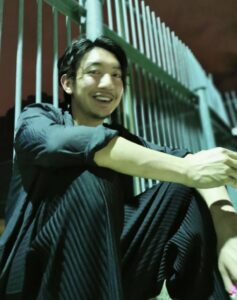Hangovers and inertia in Hong Kong
Batshit Seven
by Sheung-King
Toronto: Penguin Canada, 2024
$24.95 / 9780735245303
Reviewed by Jessica Poon
*

Sheung-King’s debut novel, You Are Eating an Orange. You Are Naked., was largely told in second-person, openly criticized the universally lauded film Lost in Translation, and featured dialogue that alternated between blandly quotidian and incredibly unhinged. Beer drinking, international travel, and taxi rides featured prominently. The protagonist’s love interest was capricious, frustrating, and witty.
The book could accurately yet brainlessly be described as audacious and timely. But neither of these adjectives convey what a self-aware middle finger the novel is to the Western canon.
I guessed that Sheung-King’s follow-up was going to be normal-ish in subject matter, but conspicuously bizarre in terms of style. In other words, the novel equivalent of Wrong Shoe Theory: an uncanny delight. My suspicions were correct.
The title of a book tells you what set of expectations are reasonable. Sheung-King’s second novel is called Batshit Seven. As far as I can tell, Batshit Seven’s title shows the author having some anarchic fun with creating a mood without necessarily making any promises. The phrase is nowhere to be found in the book, though it is an apropos phrase to describe the frenetic mood.
Batshit Seven is told in an authoritative third-person. Occasionally, though, the narrator does seem to directly address the reader. For instance, “This is why, sixty-eight years later, Sir Alexander Grantham, when we don’t have a place to fuck, we fuck at this dam built to commemorate you.” Sheung-King (Vancouver-born, Hong Kong-reared, and now based in Toronto) scatters QR codes throughout—a visual metaphor for not only the ephemerality of digitalia, but life itself. In the same way that menus being replaced with QR codes have an ugly, efficient alienness, in the novel their presence is an invitation to either acknowledge the true cost of convenience, or to simply bat an eye and turn the other page.
The protagonist, Glen Wu, referred to almost exclusively as Glue, passes his days in an apartment in Hong Kong. He might have a drinking problem. He visits Pornhub more than strictly necessary. Glue was once enrolled in an MFA writing program; he dropped out. He probably doesn’t have toxic masculinity issues, but maybe that’s evidence he does. Though his politics might be progressive, he’s so ensconced in hangovers and inertia that his beliefs seldom catalyze into action.
When Glue eventually gets a job as an ESL instructor, he respects neither the job nor his employer. Glue’s sister, Gwen, is far more adept at impersonating, or actually being, a Proper Grown-up. She’s engaged to Lester Tse, who, much like Harold Li in Sheung-King’s Eating an Orange, is always referred to by his first and last name and serves as Glue’s foil—competent when it comes to capitalistic transactions, with external accolades to boot. Yet, underneath the unctuous bullshit, Lester Tse harbours an insecure vulnerability—you know, the one we all have and, with varying success, desperately conceal.

Glue’s most significant romantic relationship with Elle, back when Glue resided in Toronto, continues to haunt him. May, the woman he is currently having sex with, might not even be named May. But she does confess that she’s stolen something from Glue, which becomes an ongoing MacGuffin. Glue ejaculates in public and doesn’t get caught, which almost seems like an allegory for how marginal and passive his life is. The world hardly notices him, not even after he assaults a strange man in a noodle shop.
There is certainly no way this novel could be described as feel-good; even so, I am quite glad that it exists. It is fast-paced, strategically repetitive, and also unpredictable. Though the presence of the Internet is hardly anything new in a contemporary novel, Sheung-King handles it in such a way that you become even more uncomfortably aware of how irrevocably embedded we are in it (or it is embedded in us). His approach is not revelatory so much as a dismal, sometimes comedic series of reiterations.
None of the sex in Batshit Seven is romantic or sexy. The novel is sexually explicit but not gratuitous. The origins of Glue and May’s meet-cute is prosaic—Glue and May “ … met on Tinder, matched less so because they were attracted to each other than because they both lived in the same neighbourhood.” Arguably, the novel’s most intimate sex is the not infrequent masturbation, which reminded me of Philip Seymour Hoffman’s character in the ironically titled film, Happiness: crying after masturbation and using the ejaculate as glue. It’s not pretty. In other words, none of the masturbation feels like self-love but a means to an end, much like teaching English to pay rent.
Sheung-King uses several short sentences when it comes to describing masturbation. The effect is droll:
His balls are not saggy. He started a new workout routine lately and is drinking more water. Glue is not sure if that helps his balls. It probably does. Glue will probably have to start eating tiger penis soup when he gets older. Or some other Chinese remedy to keep his dick going. Glue can’t imagine not being able to masturbate. Glue forgets whom he learned this from, that a lot of white supremacists don’t masturbate. This makes Glue want to masturbate even more. Glue wonders what would happen if he started eating tiger penis soup now. Glue’s dick is getting hard. Glue sometimes wants to die.
If anything, the sexiest parts of the book are the casually strewn about descriptions of delicious food. Think: salty pork bone broth.
In life, often, you don’t get the answer to your curiosities. Or, you do, and it’s disillusioning. The dreams you cultivated in adolescence prove to be unrealistically optimistic. Art does not solve racism, or, indeed, life’s prevailing issues. A crap work of art is hailed as a masterpiece, while the best art goes forever undiscovered. Racism changes hats and acquires new terminology, but remains present. Malaise, pathos, and reality become synonyms. Every once in a while, however, the urge to create something of beauty and profundity, whether in the form of writing, or seeing if the woman you slept with might want something more than fornication, comes to you, unbidden, with the yellow vigour of an egg tart. This novel is such an egg tart.
[Editor’s note: you can read Jessica’s review of Sheung-King’s first novel here.]
*

Originally from East Vancouver, Jessica Poon is a writer, former line cook, and pianist of dubious merit who recently returned to BC after completing a MFA in Creative Writing at the University of Guelph. [Editor’s note: Jessica Poon has reviewed books by Loghan Paylor, Lisa Moore (ed.), Sandra Kelly, Robyn Harding, Ian and Will Ferguson, Christine Lai, Logan Macnair, Jen Sookfong Lee, J.M. Miro (Steven Price), Bri Beaudoin, Tetsuro Shigematsu, Katie Welch, Megan Gail Coles, and Ayesha Chaudhry for BCR]
*
The British Columbia Review
Interim Editors, 2023-25: Trevor Marc Hughes (nonfiction), Brett Josef Grubisic (fiction)
Publisher: Richard Mackie
Formerly The Ormsby Review, The British Columbia Review is an on-line book review and journal service for BC writers and readers. The Advisory Board now consists of Jean Barman, Wade Davis, Robin Fisher, Barry Gough, Hugh Johnston, Kathy Mezei, Patricia Roy, Maria Tippett, and Graeme Wynn. Provincial Government Patron (since September 2018): Creative BC. Honorary Patron: Yosef Wosk. Scholarly Patron: SFU Graduate Liberal Studies. The British Columbia Review was founded in 2016 by Richard Mackie and Alan Twigg.
“Only connect.” – E.M. Forster
6 comments on “Hangovers and inertia in Hong Kong”